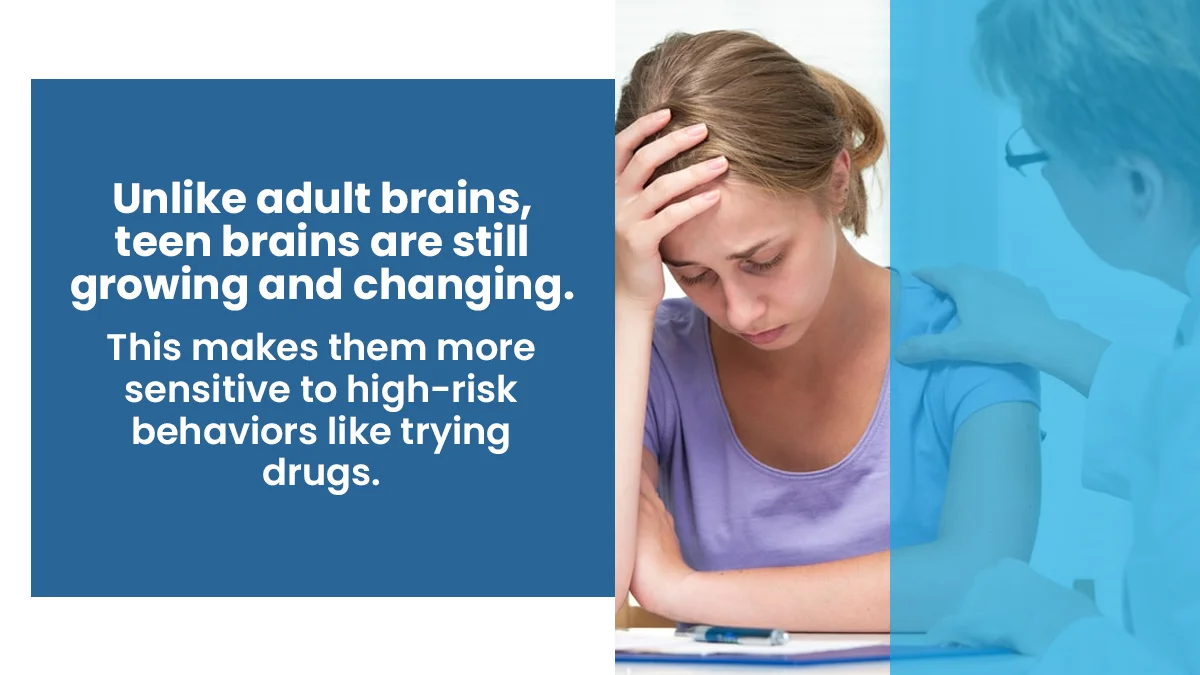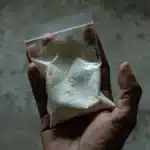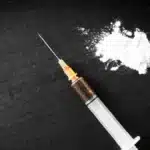Adolescence is a critical period of brain development characterized by heightened impulsivity, risk-taking behavior, and prone to peer influence. This developmental stage also coincides with an increased vulnerability to substance use disorders.
Heroin and prescription opioids are highly addictive substances and pose significant risks to teens due to their ability to induce euphoria while altering brain chemistry. The adolescent brain’s reward system is susceptible to these effects, making teens more likely to seek out and become dependent on these drugs.
Key Takeaways
Understanding why teens are more vulnerable to heroin and prescription opioids is vital for prevention. Here is what you will learn:
- ·Teen brains are still developing, making them more vulnerable to the addictive nature of opioids.
- ·Peer pressure often drives teens to engage in risky behaviors, including experimenting with drugs.
- ·Limited awareness about the dangers of opioids can lead to curiosity and experimentation among teenagers.
The Haven Detox-Little Rock offers comprehensive treatment programs to help your teen on their journey to recovery. Reach out at (501) 271-3342 to learn more.

The Opioid Crisis And Teens
The opioid crisis is a big problem that affects many people, including teens. Opioids are strong painkillers that can be addictive. Some teens might try opioids because they’re curious or want to fit in with friends. But even trying opioids once can lead to addiction and other serious health problems.
Teens need to understand the risks and make safe choices. Parents, teachers, and communities need to work together to educate teens about the dangers of opioids and offer support to those who may be struggling.
Understanding The Teenage Brain
The teenage brain is a work in progress. Doctors say it’s like a construction site with many buildings and changes. This phase is called adolescence, when the brain develops quickly. Understanding this helps us make sense of the choices teens make.
How The Teenage Brain Is Different
Unlike adult brains, teen brains are still growing and changing. This makes them more flexible but also more sensitive. When teens feel pain or pleasure, their brains react differently than adults. This can sometimes lead to high-risk behaviors, like trying drugs.
Risk-Taking And Impulsivity During Adolescence
During adolescence, the brain’s reward system is super active. This can make teens more likely to take risks without thinking them through. Doctors believe this can also make them more vulnerable to opioid abuse and drug addiction.
Heroin And Prescription Opioids: An Overview
Heroin and prescription opioids are powerful and addictive substances that can have severe consequences for individuals, especially teens. Recognizing the risks associated with these drugs is crucial for prevention and intervention efforts. Here’s an overview:
Heroin Addiction In Teens
Heroin addiction in teens is a severe concern linked to the opioid epidemic gripping our nation. Researchers have found that adolescent opioid use can lead to a higher risk of later heroin use. Teens might start with nonmedical prescription opioid use, often obtained from family members or friends.
Misuse of opioid medications can quickly spiral into addiction. Protective factors, like strong family connections and positive peer relationships, can help prevent teen opioid abuse.
Prescription Opioids: A Gateway To Heroin?
The connection between prescription opioids and heroin use has been a topic of concern in public health and policy discussions. Prescription opioids, often given to treat pain, have become a gateway to heroin for many youngsters.
The misuse of prescription opioids can increase the risk of later heroin use. Researchers have found that a significant number of teenagers who misuse prescription opioids move on to heroin.
Why Teens Are More Vulnerable In The Opioid Crisis
Teens are particularly vulnerable to the opioid crisis due to a combination of biological, social, and environmental factors that make this age group more susceptible to the dangers of opioid misuse and addiction.
Peer Pressure And The Desire To Fit In
Peer pressure plays a significant role in why adolescents might try opioids. Teens often want to fit in with their friends and may feel pressured to use drugs to be accepted. Studies have shown that high school students who think they don’t belong are more likely to misuse prescription drugs. This can lead to severe problems, including opioid addiction and overdoses.
Self-medication And Coping Mechanisms
Some young people turn to opioids as a way to cope with stress or emotional pain. They might use these drugs to numb their feelings or escape from problems at home or school. Adolescents with mental health issues are at a higher risk of developing substance use disorders. This self-medication can quickly lead to opioid-use disorder, especially among vulnerable youth.
Accessibility To Prescription Pills
Accessibility to prescription pills is another significant risk factor for adolescents. Many young people can easily access these drugs from family medicine cabinets or friends. High schools in the United States are not immune to the opioid crisis, with some students even selling or sharing prescription drugs. This easy access increases the chances of drug abuse among children and young adults.
The Impact Of Opioid Addiction On Teens
Opioid addiction among teens has become a pressing concern in recent years. The effects reach beyond physical health, affecting emotional well-being and creating socioeconomic challenges.
Physical Consequences Of Opioid Addiction
Teens who fall into opioid addiction face severe physical consequences. Their bodies can become dependent on the drugs, leading to withdrawal symptoms when not using. Over time, their health deteriorates, risking overdose and other health issues due to substance abuse.
Emotional And Psychological Impact
Emotionally, opioid addiction takes a toll on teens’ mental health. They may experience anxiety, depression, and mood swings, making daily life challenging. Psychological effects often linger even after quitting, requiring long-term support and therapy.
Socioeconomic Fallout And The Future
The impact of opioid addiction extends to the socioeconomic realm, affecting teens’ education and prospects. High-risk substance use can lead to dropping out of school, lower job opportunities, and involvement in criminal activities. Communities also bear the brunt of higher rates of drug use disorders and associated costs.
Prevention And Intervention Strategies
Preventing and intervening in teen drug addiction is crucial for their well-being and future. Here are some strategies that can be effective:
Education About Drug Abuse: An Essential Preventive Step
Teaching young people about the dangers of drug abuse is crucial for prevention. Schools can offer classes that explain what drugs are, how they affect the body and mind, and the risks involved in using them.
By providing accurate information, students can make informed decisions and resist peer pressure to try drugs. Community programs and workshops can also help raise awareness, emphasizing the importance of staying drug-free and seeking help if needed.
Role Of Parents And Teachers In Preventing Opioid Abuse
Parents and teachers play vital roles in preventing opioid abuse among teens. They can start by talking openly about the risks of prescription drugs and illegal opioids. By fostering open communication, teens feel supported and are more likely to ask questions and share concerns.
Parents and teachers should also monitor teens’ behavior and look for signs of drug use, offering guidance and support when needed. Collaboration between home and school creates a strong support network for teens, helping them make healthy choices.
Treatment Options For Teens Struggling With Opioid Addiction
When teens struggle with opioid addiction, timely intervention and appropriate treatment are essential. Treatment options often include individual and group counseling to address underlying issues and develop coping strategies.
Medication-assisted treatment may also be used under medical supervision to manage withdrawal symptoms and cravings. Family therapy can help strengthen relationships and create a supportive environment for recovery.
Frequently Asked Questions (FAQs)
Opioid dependence can affect anyone who uses these drugs, but some people are more at risk than others. People who take opioids for a long time, especially for chronic pain, are more likely to become dependent.
Additionally, those who misuse opioids, like taking larger doses than prescribed or using them without a prescription, increase their risk. People with a history of substance abuse or mental health issues also have a higher chance of developing dependence. It’s essential to use opioids as prescribed by a doctor and to be aware of the signs of dependence to seek help early if needed.
Drugs can have severe effects on teenagers’ lives. Using drugs can harm their brain development, making it harder for them to think clearly and make good decisions. It can also lead to problems in school, like poor grades or skipping classes.
Teenagers who use drugs might become moody, lose interest in activities they used to enjoy, or have trouble getting along with family and friends. Some drugs can even lead to addiction, making it challenging to stop using them even when they want to. Teenagers need to understand these risks and avoid using drugs to protect their health and future.
Teenagers might try drugs for various reasons, like curiosity, wanting to fit in with friends, or dealing with stress or emotional issues. Some teens think drugs will help them feel better or escape problems temporarily. However, using drugs can lead to addiction because they can change the brain’s chemistry over time.
When someone becomes addicted, they feel a strong urge to keep using the drug, even if it causes problems in their life. Addiction can happen quickly, especially with certain medications, making it hard for teenagers to stop using them on their own. That’s why it’s crucial to understand the risks and avoid experimenting with drugs.
Choose Hope With The Haven Detox-Little Rock
Are you or a loved one struggling with addiction? The Haven Detox-Little Rock is here to provide treatment and support for those struggling with substance abuse.
Our medical detox offers a safe and compassionate environment, allowing individuals to begin their healing journey with confidence.
Our residential treatment offers personalized care and addresses addiction’s underlying issues, while IV therapy replenishes essential nutrients, promoting faster recovery.
Act now and call us at (501) 271-3342– your recovery starts here!




